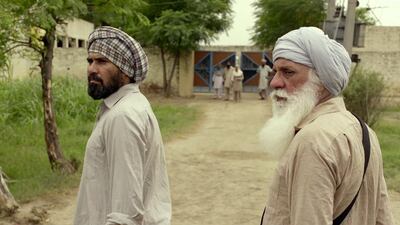When you’re dealing with a subject as divisive and devastating as an insurgency, the usual tendency is to go for the grand overarching narrative. It’s all too tempting to populate your cinematic canvas with firebrand militants, imperious security forces, the noisy clash of ideologies and all the drama and brutality of internecine violence. This shock and awe approach, saddled with the inevitable romantic subplot, has been the standard Indian formula for such films, which usually end up trading in clichés and hackneyed political sermons.
Director Gurvinder Singh smartly avoids falling into this trap in his National Film Award-winning second film, Chauthi Koot (The Fourth Direction), by focusing his lens on the individual as he tries to survive in a Punjab plunged into darkness and fear by a violent insurrection, with equally vicious counter-insurgency forces. The film, which combines two short stories by the Sahitya Akademi Award-winning author and co-scriptwriter Waryam Singh Sandhu, is an insightful and artfully restrained study of the psychology of fear, and the violence and poisonous suspicion it unleashes within households and communities.
It opens with two Hindu men, Jugal (Kanwaljit Singh) and Raj (Harnek Aulakh), on a rickety bus in Punjab, sometime in 1984. The Sikh insurgency for a separate homeland called Khalistan has been raging for years, with thousands of deaths. The Indian Army, on prime minister Indira Gandhi’s orders, stormed the holiest Sikh gurdwara, Amritsar’s Golden Temple, a few months ago to flush out heavily-armed militants. Hundreds die. Indira Gandhi herself would be assassinated by her Sikh bodyguards around the time of the bus ride, unleashing a massive pogrom against the Sikhs in Delhi and Punjab. None of these events are referenced, but their presence looms large in the worried faces of the travellers as they stare into oblivion and sneak shifty glances at their co-passengers.
The first 20 minutes of the film follows these two as they miss their train to Amritsar and, along with a Sikh gentleman, force their way into the guard’s compartment of an empty train. There are two Sikh youths already in there, and this motley group sits in a silence, drenched in anxiety and mutual suspicion.
There is minimal dialogue; everything that needs to be said is etched on the passengers’ expressions, as the camera lingers uncomfortably on each face. The sequence is a microcosm of the atmosphere of fear and tension that prevailed over Punjab at the time.
Then, through an interesting variation on the old flashback technique, the focus shifts to a rural household inhabited by Sikh farmer Joginder (Suvinder Vikky), his family and their pet dog, Tommy. The militants have ordered Joginder to kill Tommy, whose untimely barking at night betrays their movements. They visit the family in the dead of night to remind them of the consequences of not following orders. In the daytime, contemptuous security forces ransack the house in search of militants, the officer even ordering a soldier to shoot Tommy (he missed).
The slow burn narrative explores the inner conflict of Joginder and his family as they agonise over the decision. Sometimes they make half-hearted attempts to get rid of their beloved pet. Other times, they reassure themselves, perhaps futilely, that they will protect him. Courage mixes with terror, and danger constantly lurks in the shadows.
Much like the historical context, the violence is largely implicit instead of overt, intruding on to our senses only through sounds – a distant gunshot, a rustling in the paddy fields at night, or a BBC Hindi radio news report about Operation Blue Star. The excellent sound design, combined with cinematographer Satyajit Rai Nagpaul’s beautifully intimate frames, works to pull the viewer into the action – part witness, part voyeur.
The largely amateur cast seems to have lines of worry and exhaustion written on their faces; the grime, the furrowed brows and vacant stares mapping out the toll and trauma of those bloody years. The sparseness and austerity of Singh’s filmmaking forces your mind to engage in the construction of meaning, to think and feel actively instead of being led around by the nose. Singh proves that you don’t need Michael Bay-esque set pieces to keep filmgoers on the edge of their seats, mangling their nails into pulp.
Chauthi Koot leaves you not with easy takeaways but with an uneasiness and discomfort that is hard to shake off. And, perhaps, in its closing sequences that jump back to that tension-filled train ride, a tentative smidgen of hope. Most importantly, it's an exceptionally empathetic portrait of the human struggles that are all too often buried under the weight of history's erasing and sanitising macro-lens. Don't miss it.
Bhanuj Kappal is a freelance journalist based in Mumbai who writes about music, protest culture and politics.

